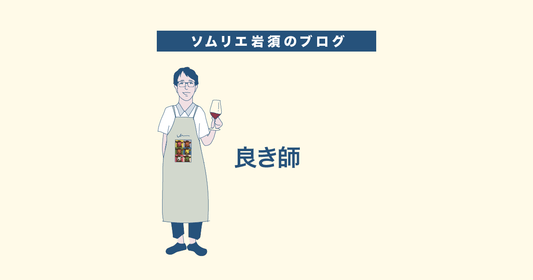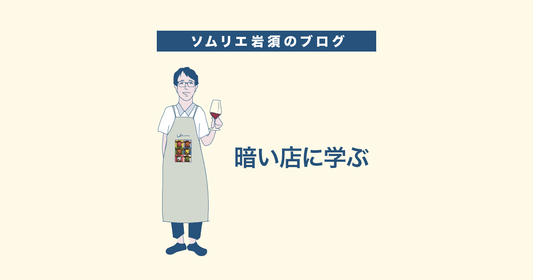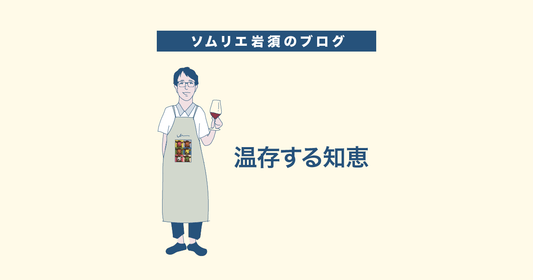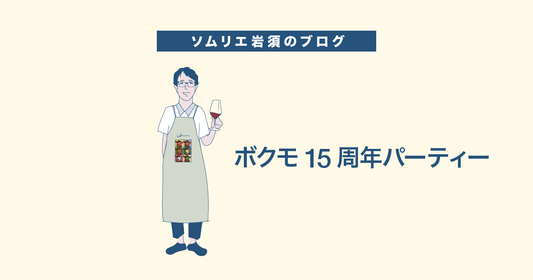
Today, I'd like to write about what I think about on a daily basis when working in the wine industry.
There are all kinds of people around me. Some are cheerful and friendly, while others are a little hard to read. There are also serious types with neatly parted hair, and some a little dangerous types who look like they might run off on a stolen motorcycle.
I think it's fun to meet so many different types of people.
However, if you think about it, this categorization is quite selfish. Labeling someone as "cheerful" or "serious" is a prejudice that makes those elements seem stronger to me. Of course, people are much more multifaceted than that.
A sociable person may be surprisingly quiet at home, and someone who is sensible in public may behave in a dangerous manner when they are alone.
If you first thought, "That person is kind," then as you get to know them more often, you will begin to pick up on their subtle expressions and be able to analyze, "They're not just kind. They're strong, too. The painful experiences they had as a child are what make them so charming. The occasional look of ennui that they show also speaks to that."
Right? Dear customer.
"Huh? I'm not feeling any pain or anything."
...Huh?
My eyes are poor, so my analysis is sometimes completely wrong.
Just as there are many different types of people, there are also many different types of wines. Gentle, sharp, rough, delicate, lively, aged. A single wine can have several of these elements mixed together. It can be approachable but delicate. It can be sharp and lively. It has many facets.
However, when it comes to talking about wine like this, I think most people immediately feel like they don't get it. That's because in Japan, it's common for people to like drinking wine but not know much about it.
There is a big gap between the momentary joy of "tasting delicious" and the act of digging deeper into wine, satisfying your desire for knowledge by learning about its origin, variety, pairings, etc., and enjoying the cultural aspects of wine. For many people, wine is a complicated world, so digging deep into it is a pain. The gap is fine as it is.
In other words, wine is not something you meet frequently and read expressions from. It is not a family member or a colleague. It is someone who happens to be at the bar. With such an unusual person, it is okay to have a casual relationship for just that moment. In-depth information such as the person's background, hobbies, mistakes at work, cutting their nails too short, or how to care for their parents is just a bother.
However, what if the person at the counter was like this?
We happen to be from the same hometown. We share the same hobbies. We have very similar sensibilities. If the master taught us that, don't you think the counter talk would be super lively?
"Really? You're from Komaki and used to go fishing there a lot. Iruka Pond, right? Me too, the dengaku at Miharashichaya is really good!"
Then, you suddenly become interested in that person and want to know more. You want to talk more. "Master, if you knew what we had in common, you should have told me sooner." "Meetings like this are really fun."
That's it!!!
My goal is to become a master of wine: "People - Me - Wine."
I know more about wine than the average person. But wine doesn't tell me anything about itself. It's difficult and difficult to speak. It's waiting to be told (sorry for the pretentious expression).
For example, even if you think at first glance that a certain wine doesn't have much of a distinctive character, you might think, "It has little dissolved oxygen and is reducing, so if I expose it to air, the rich aroma should emerge. Maybe it'll really come out if I decant it." Sorry for suddenly getting technical, but there are wines like that.
So what I do is find out what the customer likes, think of the characteristics of several wines in my head, look for commonalities between them, and then, although it may be a bit intrusive, I ask them what they think of a wine.
If the matchmaking goes well, hurrah. Cheers to a good encounter. Viva meddling.
If you fail, they'll say things like, "How dare you introduce such a nasty person," or "I'll never come again!" (although it'll be pretty disheartening if they say that).
In other words, my job is to ensure that wine and people are matched.
To increase the matching rate, it is important to know the wine (your favorite) more deeply and to introduce it in simple words that are as easy to understand as possible. This is difficult. In any field, "explaining in simple words" is a fairly advanced technique. Know the whole picture, know the details, what information to leave out, and what metaphors to use.
To hone my skills, I taste wines every day, attend study sessions, read books, think about pairings, and then summarize and verbalize it in the wine seminars I teach. First, I dig deep myself. Then I find out the level of the person I'm communicating with. Then I choose words that are appropriate to that level and communicate it. I repeat this process.
At the same time, you need to be interested in people's tastes and characteristics and guess their preferences. Recently, I've been reading psychology books and the like, but to be honest, I still have a long way to go. I think I need to put in more effort in that area. I'm a bit of a blind person.
However, I think this technique will be replaced by AI in the future. If you input what you usually eat and what you like, you can find your favorite wine from a huge database. Such an era will surely come. But it won't be in five years. It will be about 10 years at the earliest.
I will be in my mid-50s then. What should I do?
Yes, he was probably thinking of a way of being a busybody that only an older man of that age could be. He was saying that a mature knuckle hole might actually have a use, or something like that.





